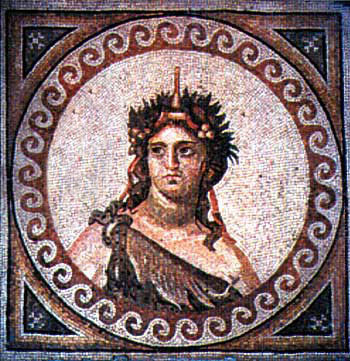Nonnus of Panopolis in Context IV -19-20-21/04/2018, Ghent (Belgium)
- 2 jul 2017
- 4 Min. de lectura

‘Nonnus in Context’
Once understudied, the fascinating poetry of Nonnus of Panopolis (5th c AD and author of both the last grand epic poem of antiquity and of a hexametric paraphrase of the Gospel of John in the same ‘baroque’ style) has, in the past decades, aroused the interest of many. One of the results of this (re)new(ed) interest in the poetry of the ‘Egyptian Homer’ is the recently appeared Brill’s Companion to Nonnus (2016) – voluminous like Nonnus’ work itself. In the preface, the editor, Domenico Accorinti, adequately describes the ongoing process of Nonnus’ “becoming a classic” and how the current vitality of the scholarly dialogue on Nonnus contributes to that.
One of the signs of this vitality are the ‘Nonnus in Context’ conferences, a series of scientific gatherings initiated by Konstantinus Spanoudakis, who organized the first one in May 2011 (proceedings: ed. Spanoudakis 2014) and after him continued by Herbert Bannert and Nicole Kröll (Vienna 2013) and Filip Doroszewski (Warsaw 2015). Ghent 2018 is the fourth event in what by now is an established series.
FECHA/DATE/DATA: 19-20-21/04/2018
LUGAR/LOCATION/LUOGO: University of Ghent (Ghent, Belgium)
ORGANIZADOR/ORGANIZER/ORGANIZZATORE: Berenice Verhelst (Ghent) ; Kristoffel Demoen (Ghent) ; Koen De Temmerman (Ghent) ; Fotini Hadjittofi (Lisbon ;, David Hernández de la Fuete (Uned Madrid) ; Johan Leemans (Leuven) ; Anna Lefteratou (Heidelberg) ; Rachele Ricceri (Ghent) ; Tine Scheijnen (Ghent) ; Peter Van Deun (Leuven).
INFO: web - berenice.verhelst@ugent.be
INSCRIPCIÓN/REGISTRATION/REGISTRAZIONE: Deadline: 05/04/2018 Aquí/here/qui
- Cena (opcional)/dinner (optional)/ cena (opzionale): €27
- Visita guiada por la ciudad (opcional)/guided city walk (optional) /passeggiata guidata della città (opzionale): €4
PROGRAMA/PROGRAM/PROGRAMMA: Disponible también aquí/also available here/anche disponibile qui
Thursday the 19th of April
9:30: welcome and introduction
9:50: hommage à Pierre Chuvin (†26/12/2016) (Gianfranco Agosti)
10:00-11:00: Tim Whitmarsh: Big Data and the Dionysiaca
coffee break
11:30-13:00: panel 1: the road to the East
Richard Stoneman (Exeter): Nymphs and Elephants: Nonnus’ Depiction of India in the Dionysiaca
Fotini Hadjittofi (Lisbon): Nonnus’ Indians between Conversion and Acculturation
Luise Marion Frenkel (São Paolo): Spicing Nonnus up: commercial and religious crossroads and Nonnus’ representation of the East
lunch
14:00-15:30: panel 2: Late Antique intersections (part 1)
David Lorin (Paris): “Wandering Jews”: Tracking down the Alexandrian Jewish community in Nonnus of Panopolis’ and Cyril of Alexandria’s works
Anna Lefteratou (Heidelberg): Nuptial imagery in hexameters: The Cana Wedding in Eudocia’s Homeric Centos and in the Paraphrasis of Nonnos of Panopolis
Emanuele Castelli (München): How did Nonnus of Panopolis publish the Dionysiaca? A new approach to the genesis of the longest epic work from Antiquity and to the understanding of his ‘epyllion structure’
coffee break
16:00-17:00: panel 3: between the Archaic past and Nonnus’ Late Antique present
Michael Paschalis (Rethymno): The Lure of Paganism: Nonnus’ Paraphrase of the Gospel of John and Hesiod’s Theogony
Nicole Kröll (Vienna): Shape-shifting Athena? On the Transformation of Homeric characters in Nonnus' Dionysiaca
coffee break
17:30-18:30: Gennaro D’Ippolito (Palermo): Nonnus’ poetic activity as an expression of a unitary ideological and artistic programme
18:30-19:30: drinks reception
Friday the 20th of April
9:00-11:00: panel 4: between the Hellenistic past and Nonnus’ Late Antique present
Arianna Magnolo (Genova): Nonnus' Reinterpretation of Aratus' Astronomy in the Dionysiaca
Katerina Carvounis and Sophia Papaioannou (Athens): Phaethon in Nonnus and Ovid: exploring images and motifs in the Dionysiaca
Enrico Magnelli (Florence): Ancient Quantity and Modern Stress: an Interesting Feature of Nonnus’ Hexameter
Alexandra Madela (Dublin): Midway between Quintus of Smyrna and Nonnus: The Formulaic Diction of the Orphic Argonautica
coffee break
11:30-12:30: Hélène Frangoulis (Toulouse): Nonnos et Callimaque : une scène de bain dans les Dionysiaques
lunch
13:30-15:30: panel 5: late antique intersections (part 2)
Cosetta Cadau (Dublin): A father’s duty. A reading of Zeus’ parenthood in Nonnus’ Dionysiaca
David Hernandez de la Fuente (Madrid): A Dionysian φαντασία? Possible echoes of Neoplatonic perception and imagination theories in Nonnus
Emma Greensmith (Colgate): The Miracle Baby: Zagreus and the Poetics of Mutation
Simon Zuenelli (Innsbruck): The Book Epigram of Nonnusʼ Dionysiaca (AP 9.198). An Inscription for an Author Portrait?
coffee break
16:00-17:30: panel 6: Roads beyond Nonnus
Federica Giommoni (Florence): Reading the Paraphrase in 6th Century Constantinople: Nonnus’ Christian Poem and Agathias’ Cycle
Arianna Gullo (Durham): Nonnian poets: the case of Julian the Egyptian
Delphine Lauritzen (Venise): L’esthétique des Saisons dans les Dionysiaques et chez Jean de Gaza : poésie et iconographie
coffee break
18:00-19:00: Gianfranco Agosti (Rome): Nonnus the prose writer
Saturday the 21st of April
9:30-10:30: Domenico Accorinti (Pisa): Paul Friedländer and Nonnus’ poetry
coffee break
11:00-12:30 panel 7: metaphors at the crossroads of traditions
Emilie Van Opstall (Amsterdam): Form and function of metaphors in Nonnus’ Paraphrase of the Gospel of John
Christophe Cusset and Halima Benchikh-Lehocine (ENS de Lyon) : “Je suis la vie, la vérité et le droit chemin” (Par. 14.20 ): Routes et chemins dans la Paraphrase de Saint Jean de Nonnos de Panopolis
Laura Franco and Maria Ypsilanti (Nicosia): The Sound of Silence. Metaphors of silent eloquence in Nonnus' poetry
12:30-14:30: lunch and poster session: poster presentations by Nestan Egetashvili (Tbilisi), Emma Vanden Berghe (Ghent), Cristiano Minuto (Naples), Guy Walker (Dublin), Elena Langella (Milan) and Paulo Henrique Oliveira de Lima (São Paulo)
14:30-16:00: panel 8: Bacchic language and the crossing of boundaries
Flor Herrero Valdes (London): Nonnus and the Greco-Egyptian Magic – crossroads, poetic confluences and fringe states
Filip Doroszewski (Cardinal Stefan Wyszynski University in Warsaw): Jesus the Rival: Paraphrasis 11.185‒213 read against Euripides’ Bacchae
coffee break
16:30-17:30: panel 9: Nonnus’ roads towards today
Thomas Gärtner (Köln): “Allgemeiner Nutzen für die Knaben, damit sie den Charakter des Nonnos nachahmen” – Zur Bedeutung des Nonnos für den Philhellenismus im 16./ 17. Jahrhundert
Marta Otlewska Jung (Freie Universität Berlin): Václav Pinkava, a late Nonnian?
17:30-18:00: closing discussion

Comentarios